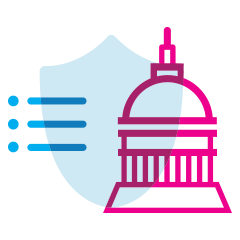
CARES Act Addresses Domestic, Global COVID-19 Priorities
The Coronavirus Aid, Relief, and Economic Security (CARES) Act, the third federal COVID-19 emergency supplemental bill, was signed by the President on March 27. The package addresses many of the domestic and global priorities IDSA and HIVMA advocated for in our letter to congressional leaders. A brief summary of the act is below and more information is available in this summary. IDSA and HIVMA will continue to assess ongoing needs for the COVID-19 response domestically and globally and urge members of Congress and the Trump Administration to ensure adequate resources.
Centers for Disease Control and Prevention
- $1.5 billion to support state and local governments to conduct public health activities, including the purchase of personal protective equipment, surveillance, laboratory testing, contact tracing, and infection control and mitigation
- $1.5 billion in flexible funding to support CDC’s continuing efforts to contain and combat the virus, including repatriation and quarantine efforts; combating antimicrobial resistance and antibiotic resistant bacteria as a result of secondary infections related to COVID-19; communicating with and informing public, state, local, and tribal governments and healthcare institutions; purchase and distribution of diagnostic test kits (including for state and local public health agencies); and support for laboratory testing
- $500 million for global disease detection and emergency response
- $300 million for the Infectious Diseases Rapid Response Reserve Fund, which supports immediate response activities during outbreaks.
National Institutes of Health
- $945 million to support research to expand on prior research plans, including improving understanding of the prevalence, natural history, transmission, diagnosis and treatment of COVID-19
- $706 million to the National Institute for Allergy and Infectious Diseases for COVID-related activities, including vaccine activities.
HHS Office of the Assistant Secretary for Preparedness and Response
- Funding for research related to antibiotic resistant secondary infections associated with coronavirus
- More than $27 billion for the Biomedical Advanced Research and Development Authority to support research and development of vaccines, therapeutics and diagnostics to prevent or treat the effects of coronavirus, including $16 billion for the Strategic National Stockpile for critical medical supplies, personal protective equipment, and life-saving medicine.
USAID
- $258 million for the International Disaster Assistance to respond to the extraordinary needs in other countries that are underequipped to respond to the pandemic, particularly populations affected by ongoing humanitarian crises.
Health Resources and Services Administration
- $275 million for HRSA, including $90 million for Ryan White HIV/AIDS programs.
Department of Housing and Urban Development
- Funding for several housing programs, including $65 million for Housing Opportunities for Persons with AIDS, $4 billion for homeless assistance grants, $1 billion in rental assistance and $50 million for housing assistance for the elderly.
The bill also closes a loophole in coverage for COVID-19 testing identified by IDSA, now requiring coverage for tests currently under FDA Emergency Use Authorization review.
Department of Defense
- $1 billion for the Defense Production Act to increase access to materials essential for national security and pandemic recovery.
Financial and Social Services
- The bill includes funding to blunt the economic impact of COVID-19, including child-care assistance to health care sector employees, emergency responders, sanitation workers and other workers deemed essential during the response to the coronavirus. The package also includes funding for affordable housing and homelessness assistance programs, paid leave and unemployment benefit supports, and nutrition resources for individuals and families in need.

